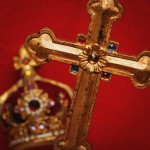In part I and part II of this series, I built on the premise that Jesus used the metaphor of the kingdom to describe His rule because the concept of the earthly kingdom was the thing most like Jesus’ rule.
I suggested we could look at earthly kingdoms and where their characteristics aligned with the Bible’s descriptions of the kingdom of God, we could learn something about the kingdom of God. In the first two posts, I built on this premise with the issue of sovereignty. Here I address the issues of territorial sovereignty and royal lineage.
Territorial Sovereignty. Like earthly kings, Jesus’ sovereignty is complete and coextensive with the jurisdiction of His kingdom. Jesus’ sovereignty is not limited to a particular area but includes the entire natural realm and spiritual realm. All authority in heaven and on earth has been given to Jesus. (Matt. 28:18). As a result, Jesus has authority over the demons that dwell in the spiritual realm (Luke 4:36) and all the humans who dwell on the earth. (John 17:2). It makes sense that all authority in the spiritual realm and natural realm would be given to Jesus, because without it He would not be able to fulfill His role as King throughout His entire jurisdiction.
Royal Lineage. Throughout history, kings have obtained their royal status through the lineage of their father. One became a king by being the first born of his father’s seed, not because of political skills or popularity. In this respect, the Greeks and the early rulers of the Roman Republic were an anomaly, but by the first century, Rome had also embraced a mode of succession based on birth.
Those living in Judea during the first century would have been familiar with the kingly line of Herod The Great, ruler of Judea, who was succeeded by his son Archelus, his grandson King Herod Agrippa I and great grandson King Herod Agrippa II. They would also have been familiar with Tiberius Caesar, who ruled the Roman Empire from AD 14 through AD37 and whose earthly authority they encountered on a daily basis. It would have been common knowledge to them that Tiberius Caesar’s royal lineage was traced through his stepfather, Caesar Augustus from whom he obtained the throne.
Like earthly kings, Jesus was born a king. When the magi came to worship Jesus, they asked, “Where is He who has been born King of the Jews.” (Matt. 2:2). Jesus was born a king by virtue of his heavenly Father. (I Sam. 8:7). Jesus did not have an earthly biological father because Jesus was conceived by the Holy Spirit, not by the seed of man. (Matt. 1:20.). But like Tiberius Caesar , who was Roman Emperor duringJesus’ earthly ministry, Jesus’ royal earthly lineage was traced through His stepfather Joseph, who was a descendant of King David. (Matt. 1:1-16.).
Consequently, Jesus’ royal lineage was both spiritual and earthly, just as the jurisdiction of His kingdom is spiritual and earthly. GS


